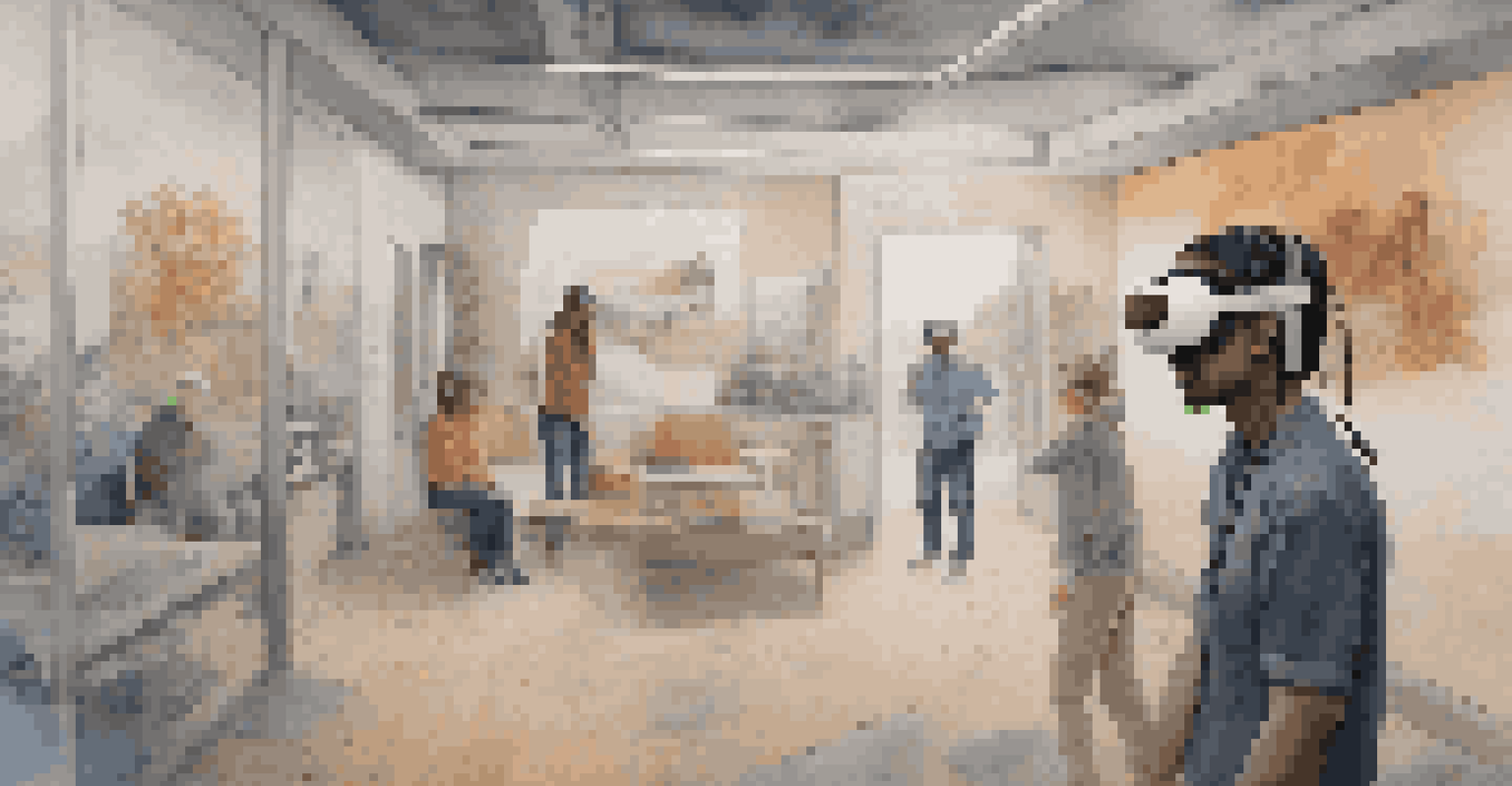AR and Emotional Intelligence: Building Social Skills

Understanding Augmented Reality (AR) and Its Purpose
Augmented Reality (AR) blends digital information with the real world, creating immersive experiences that enhance how we perceive our surroundings. Think of it like adding a layer of magic to your everyday environment, where digital elements can interact with physical objects. This technology is not just for gaming or entertainment; it has potential applications in education, healthcare, and even social skills development.
The greatest weapon against stress is our ability to choose one thought over another.
By overlaying digital content onto the real world, AR can provide unique opportunities for users to engage with complex concepts in a more intuitive way. For instance, students can visualize historical events or scientific phenomena right in their classroom, making learning more interactive and engaging. This interactive approach can also be harnessed to teach emotional intelligence skills in a fun and dynamic manner.
As AR continues to evolve, its ability to foster emotional understanding and empathy will become increasingly relevant. Imagine a scenario where individuals can practice social interactions in a safe, controlled environment, helping them navigate real-life situations with greater ease and confidence.
The Connection Between Emotional Intelligence and Social Skills
Emotional intelligence (EI) refers to the ability to recognize, understand, and manage our own emotions while also being able to empathize with others. This skill set is crucial for effective communication and fostering healthy relationships. Think of EI as the compass guiding our social interactions, helping us navigate the sometimes tricky waters of human emotions.

Social skills, on the other hand, are the tools we use to communicate and interact with others. They include everything from active listening and speaking clearly to reading non-verbal cues. When we combine emotional intelligence with strong social skills, we create a powerful synergy that can lead to healthier relationships and more successful interactions.
AR Enhances Emotional Learning
Augmented Reality provides immersive experiences that make learning emotional intelligence engaging and effective.
In many social situations, being emotionally aware can enhance our ability to connect with others. For example, recognizing when someone is feeling down allows us to respond with empathy and kindness, strengthening our bond with them. This combination of EI and social skills is essential in both personal and professional contexts.
How AR Can Enhance Emotional Intelligence Development
AR offers unique tools that can make learning emotional intelligence engaging and effective. By creating immersive scenarios where individuals can practice identifying emotions in themselves and others, AR can provide real-time feedback and guidance. Imagine donning AR glasses and stepping into a virtual coffee shop, where you can practice conversations with avatars that display various emotional cues.
Empathy is about finding echoes of another person in yourself.
This kind of experiential learning allows users to refine their emotional awareness without the fear of real-world repercussions. They can experiment with different responses and see firsthand how their choices impact others' feelings. This gamified approach to learning EI can motivate individuals to practice and improve their skills actively.
Moreover, AR can help bridge the gap for those who struggle with face-to-face interactions, such as individuals on the autism spectrum. By providing controlled environments where they can rehearse social scenarios, AR can empower these individuals to gain confidence and navigate social situations more effectively.
Building Empathy Through AR Experiences
Empathy, a key component of emotional intelligence, can be fostered through immersive AR experiences that put users in someone else's shoes. For instance, AR can simulate a day in the life of a person facing challenges, allowing users to gain insight into their emotions and struggles. This type of experience can be eye-opening, making it easier to relate to others and understand their perspectives.
By experiencing life through another person's lens, users can cultivate a deeper sense of empathy and compassion. This can be particularly impactful in educational settings, where students can engage with social issues and learn to appreciate diverse viewpoints. Such experiences can lay the groundwork for more inclusive and understanding communities.
Building Empathy Through AR
AR can foster empathy by allowing users to experience life from another person's perspective, promoting understanding and compassion.
Additionally, AR can create opportunities for group discussions and reflections after these experiences, encouraging participants to share their thoughts and feelings. This collaborative aspect can further enhance empathy, as individuals learn from each other and grow together.
Practicing Conflict Resolution Skills with AR
Conflict resolution is another critical area where AR can make a significant impact. By simulating high-stakes conversations or challenging social scenarios, users can practice navigating conflicts in a risk-free environment. These AR scenarios can help individuals build confidence in their ability to handle disagreements or misunderstandings effectively.
In these immersive experiences, users can explore various approaches to resolving conflicts, testing out different communication styles and strategies. This hands-on practice can lead to a deeper understanding of how to manage emotions and respond constructively in real-life situations. Imagine being able to rehearse a tough conversation with a colleague before it happens, ensuring you approach the situation with poise and empathy.
Moreover, AR can provide immediate feedback on users' responses, helping them identify areas for improvement. This iterative process of practice and reflection can enhance their emotional intelligence and social skills, ultimately leading to more harmonious interactions.
Fostering Teamwork and Collaboration Through AR
In a world that increasingly values teamwork, AR can play a pivotal role in developing collaborative skills. By engaging in AR team-building exercises, individuals can practice working together to solve problems or complete tasks. This interactive approach promotes communication, trust, and understanding among team members, which are essential components of effective collaboration.
In these AR scenarios, participants can experience the dynamics of teamwork firsthand. For example, they might navigate a virtual obstacle course that requires cooperation and strategy to overcome. This shared experience can strengthen bonds and improve group cohesion, leading to more productive partnerships in both personal and professional settings.
AR for Conflict Resolution Skills
By simulating challenging social scenarios, AR helps users practice conflict resolution in a risk-free environment.
Additionally, AR can help teams identify their strengths and weaknesses through reflective discussions after these activities. By understanding each member's contributions and communication styles, teams can enhance their overall effectiveness and emotional intelligence.
The Future of AR and Emotional Intelligence Training
As technology continues to advance, the integration of AR into emotional intelligence training will likely become more prevalent. This evolution can lead to more personalized and impactful learning experiences that cater to individual needs and learning styles. Imagine a future where everyone has access to AR tools that help them develop essential social skills and emotional awareness.
Moreover, the potential for AR to reach diverse populations is immense. From schools to workplaces, AR can make emotional intelligence training accessible and engaging, benefiting a wide range of individuals. This inclusivity can contribute to a more emotionally intelligent society, where people are better equipped to connect and collaborate with one another.

As we look ahead, embracing AR in emotional intelligence training may not just enhance social skills but also foster a more empathetic and understanding world. By prioritizing emotional intelligence through innovative technology, we can equip individuals with the tools they need to thrive in their personal and professional lives.